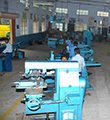
A Diploma in Electronics (Robotics) is a specialized program focused on the integration of electronics and robotics technology. Spanning typically three years, this diploma equips students with the knowledge and skills to design, develop, and maintain robotic systems. The course covers a blend of electronic engineering, robotics, automation, and programming, preparing graduates for dynamic roles in the burgeoning field of robotics and automation. Below is an overview of the core subjects, practical components, and career opportunities associated with the program.




Students are typically required to undertake project work involving the design, implementation, and testing of robotic systems. Projects may include developing autonomous robots, robotic arms, or automation systems for specific applications.
Many programs incorporate an industrial training or internship component, allowing students to gain hands-on experience in the robotics and electronics industry. This exposure is critical for understanding the practical aspects of robotics engineering.
Depending on the program, students may have the option to choose elective subjects to specialize in specific areas such as: Advanced Robotics, IoT (Internet of Things), Robotic Vision or Human-Robot Interaction.
Design, develop, and maintain robotic systems for various applications.
Develop and oversee automated systems in manufacturing and industrial environments.
Design and implement embedded systems for robotics and automation.
Implement and manage control systems for robotic applications.
Ensure the proper functioning and maintenance of robotic and automation equipment.
Provide technical support and services for robotic systems in the field.
Develop and implement software programs for controlling robotic systems.
Oversee and ensure the quality of robotic systems and processes.
Work on innovative projects and the development of new robotic technologies.
Provide technical expertise in the sale and support of robotic products and solutions.
Graduates may choose to pursue further education, such as a Bachelor’s degree in Robotics Engineering, Electronics Engineering, or related fields, to enhance their knowledge and career prospects.
With a solid foundation in electronics and robotics, graduates can also explore opportunities to start their own businesses in areas such as robotics consulting, custom automation solutions, or developing robotic products.
 About Course
About Course
 Course Details
Course Details
 Laboratory Work
Laboratory Work
 Project Work
Project Work
 Industrial Training
Industrial Training
 Elective Subjects
Elective Subjects
 Career Opportunities
Career Opportunities








